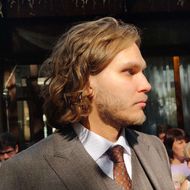Motor Control Group

Carlos Muriel Nieto Doval
PhD student, Research Assistant

Перевознюк Глеб Сергеевич
PhD student

Aleksandra Pleskovskaya
Research Assistant

Саламатин Михаил Игоревич
Research Assistant

Пономарева Дарья Сергеевна
Research assistant

Anthony Mensah
Master student
Motor Control group (MMC) uses Non Invasive Brain Stimulation (NIBS) to modulate human cortical brain processing and functions. Our group uses NIBS to increase cortical excitability which may have a huge impact in rehabilitation of patients with motor deficits. It is possible to apply transcranial electrical current (tDCS, tACS) to target specific brain regions or networks of regions in order to increase behavioural performance in healthy humans. This principle has been shown to be valid also in clinical populations of patients. Motion tracking research, NIBS, motor imagery, mirror neurons, motor plasticity, gender excitability indexes are the main topics of our group.
International colleagues
| David Bartrés-Faz, professor | BBSLab, Department of Psychiatry and Clinical Psychobiology, Faculty of Medicine, University of Barcelona, Spain. |
| Giulia Galli, PhD | Department of Psychology, Kingston University, Penrhyn Road, Kingston Upon Thames, Surrey, KT1 2EE, London, UK. |
| Simone Rossi, professor | Department of Medicine, Surgery and Neuroscience, Unit of Neurology and Clinical Neurophysiology, Brain Investigation and NeuromodulationLab. (Si-BIN Lab), Siena, Italy. |
Current projects
Project 1: Motor Imagery: Kinesthetic vs. Visual Representations.
A project that investigates the differential impact of motor imagery types on the sensory-motor system using TMS.
Project 2: Motion Tracking and Motor Planning Investigations.
A project that uses advanced motion capture techniques to study movement execution and planning.
Project 3: Machine Learning & AI in Brain Stimulation.
The development of predictive models for motor responses based on neurostimulation data.
Have you spotted a typo?
Highlight it, click Ctrl+Enter and send us a message. Thank you for your help!
To be used only for spelling or punctuation mistakes.



